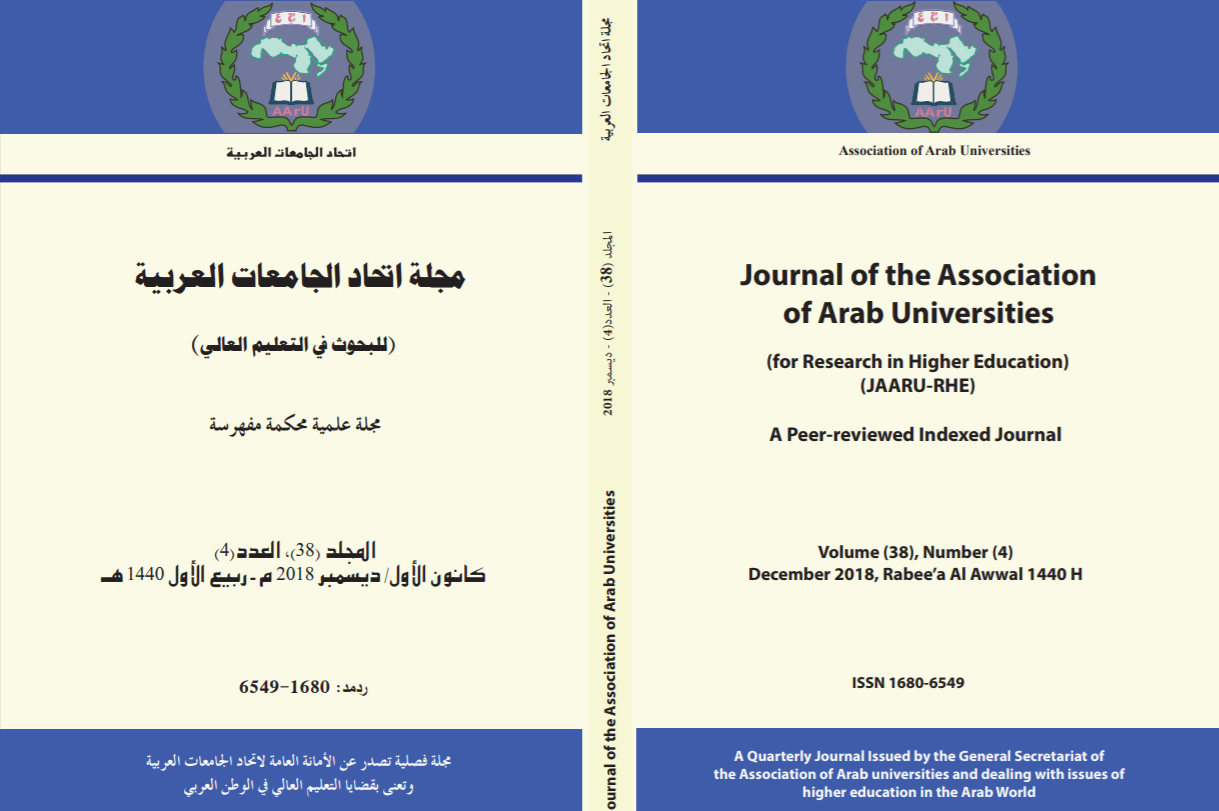Journal of the Association of Arab Universities for Research in Higher Education مجلة اتحاد الجامعات العربية للبحوث في التعليم العالي

Abstract
هدف المقال التعرف إلى أنماط القيادة التربوية (الديمقراطي، الأوتوقراطي، المتسيب) في المدارس الأردنية وأثرها على تحفيز المعلمين من وجهة نظرهم. ولتحقيق هذا الهدف، استخدمت الدراسة المنهج الوصفي التحليلي. وتكوّنت عينة الدراسة من (611) معلماً ومعلمة تمّ اختيارهم بالطريقة العشوائية الطبقية من مدارس مديرية تربية لواء القويسمة، وتم توزيع استبانة الدراسة على أفراد العينة (On-line) من خلال برمجية (Google Survey) خلال الفصل الدراسي الأول من العام الدراسي 2022/2023. وتوصلت الدراسة إلى أن أنماط القيادة التربوية الثلاثة موجودة في المدارس الأردنية من وجهة نظر العينة، وأولها وأكثرها انتشاراً هو النمط الديمقراطي، يليه النمط الأوتوقراطي، وأخيراً النمط المتسيب. ولم تتوصل الدراسة إلى وجود فروق دالة إحصائياً عند مستوى الدلالة (a≤0.05) في درجة ممارسة مديري المدارس الأردنية لأنماط القيادة التربوية وأثرها على تحفيز المعلمين تعزى لمتغير الجنس، أو متغير التخصص الأكاديمي، أو متغير سنوات الخبرة. وفي ضوء نتائج الدراسة تمت التوصية بتفعيل نمط القيادة التربوية الديمقراطي الذي ينعكس إيجاباً على تحقيق أهداف المدرسة، واستغلال دافعية المعلمين نحو إنجاز الأهداف التربوية والتعلمية
The article aimed to identify the patterns of educational leadership (democratic, autocratic, and passive) in Jordanian schools and their impact on motivating teachers from their point of view. To achieve this goal, the study used the descriptive analytical approach. The sample of the study consisted of (611) male and female teachers who were chosen randomly from the schools of the Qweismeh District Education Directorate. The study questionnaire was distributed to the sample (on-line) through the (Google Survey) software during the first semester of the academic year 2022/2023. The study revealed three patterns of educational leadership exist in Jordanian schools from the point of view of the sample, the first and most widespread is the democratic pattern, followed by the autocratic pattern, and finally the passive pattern. The study also revealed that there are no statistically significant differences at the significance level (a≤0.05) in the degree of practice of educational leadership patterns by Jordanian school principals and their impact on teacher motivation due to the gender variable, the academic specialization variable, or the years of experience variable. In the light of the results obtained, it was recommended to activate the democratic educational leadership pattern, which reflects positively on achieving the goals of the school, and to exploit the motivation of teachers towards achieving educational and learning goals
Recommended Citation
Al-Hunaty, Aida Ali Ahmad
(2024)
"أنماط القيادة التربوية في المدارس الأردنية وأثرها على تحفيز المعلمين من وجهة نظرهم,"
Journal of the Association of Arab Universities for Research in Higher Education مجلة اتحاد الجامعات العربية للبحوث في التعليم العالي: Vol. 44:
Iss.
2, Article 22.
Available at:
https://digitalcommons.aaru.edu.jo/jaaru_rhe/vol44/iss2/22

